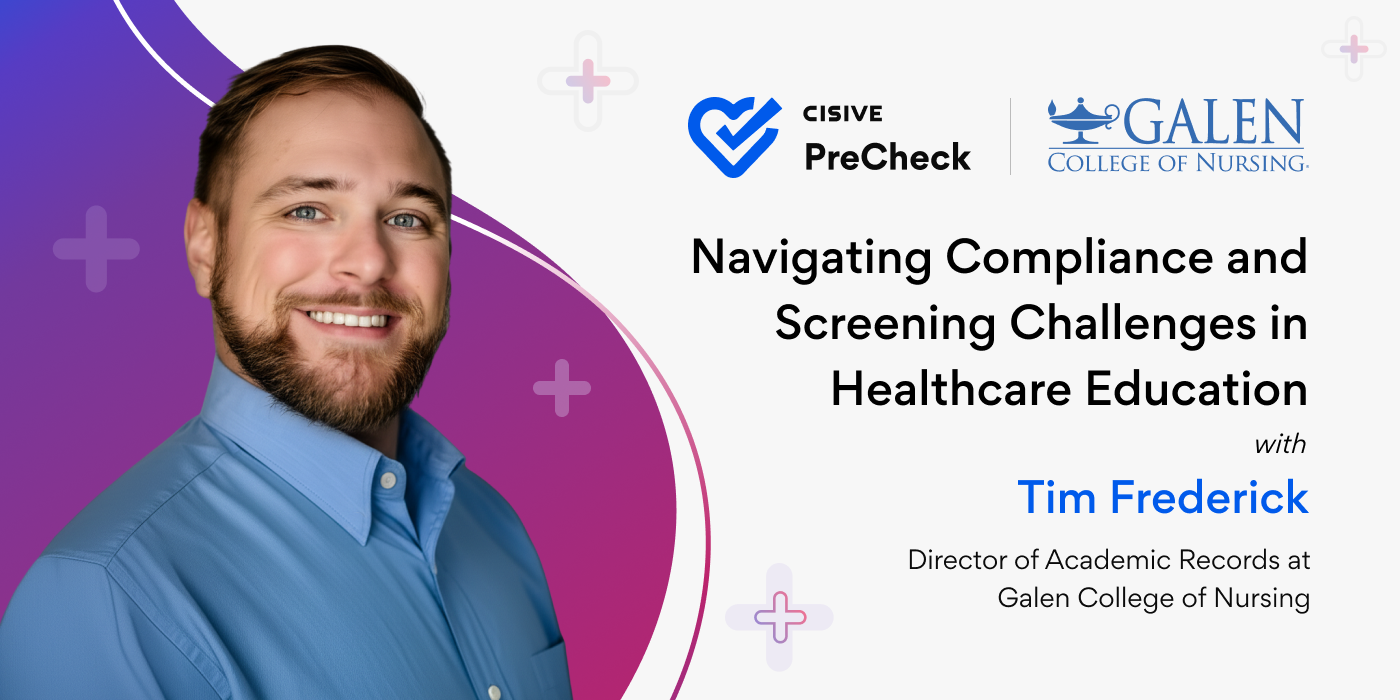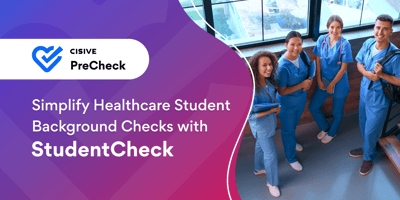

In this Product Highlight, we’ll review key tools to consider in your screening program, as well as...

Compliance and clinical readiness have become increasingly complex for nursing and allied health programs. Evolving vaccination requirements, heightened scrutiny from clinical sites, and the rise of falsified documentation have added new layers of risk for healthcare educators. Each decision about student onboarding can have significant consequences for patient safety, program reputation, and the future careers of students.
Schools must navigate a landscape where one missed compliance issue can result in lost clinical placements, accreditation challenges, or reputational damage. These pressures are magnified by the realities of serving diverse student populations, managing costs, and meeting the unique requirements of multiple states and clinical partners. To succeed, programs need not only strong internal processes but also trusted partners who can help detect problems before they escalate.
Tim Frederick, Director of Academic Records at Galen College of Nursing, has spent nearly a decade in higher education. His expertise lies in organizational planning, process development, and automation, and he now plays a central role in ensuring that Galen’s students meet the compliance standards required for clinical success. His perspective offers a clear view into the challenges healthcare educators face and the solutions that can help overcome them.
For many healthcare education programs, the landscape of vaccination compliance has shifted significantly in the years following COVID-19. Tim Frederick said, “We are definitely seeing more students opt for exemptions.” While exemptions may provide students with a path forward, they can create significant placement challenges for schools.
When a student is not fully vaccinated, program leaders must work ahead to identify clinical sites that will accept them. Frederick explains, “We want to avoid the student making it 90% of the way from the program and now they cannot do anything. If we can’t graduate them, they’re stuck.”
In some cases, only one clinical site in a given area may accept students with certain exemptions, leaving no backup options if circumstances change. The result is a high-stakes balancing act between supporting students and ensuring they can complete their required education.
These challenges are compounded by the complexity of varying state and facility requirements. “There is a lot of fragmentation between state regulation, nursing regulations, clinical facility regulations and requirements. And then in addition to that, even federal regulations, they’re all vastly different and many times we have to go with the most restrictive to solve for everything,” Frederick says. For multi-state institutions, meeting the strictest standard often becomes the default, adding additional cost, tracking requirements, and administrative workload.
The growing accessibility of AI tools, online forgeries, and diploma mills has made it easier than ever for individuals to falsify records, creating serious risks for healthcare education programs. Referencing recent cases such as Operation Nightingale, Tim Frederick warns, “The access to the ability for somebody to do something to modify a document has become easy. So we look for that as well.” When falsified immunization documents go undetected, the risks extend to “the student, the facility, the patient,” as well as the school itself. Frederick cautions, “If a student slips through the cracks, we could lose our facilities, our contracts, our partners, it never ends. You could lose everything for one of these slipping through.”
The dangers are not limited to vaccination records. A missed background check detail can have equally damaging consequences. Frederick recalls one case under a previous vendor: “A previous vendor completed a background check, came back with no issues. PreCheck came through, found a very critical felony that would prohibit that student from ever being able to partake in a nursing program.” Such oversights can undermine a program’s integrity and erode trust with clinical partners who expect rigorous compliance.
Missed compliance issues also affect the competitive admissions process. As Frederick points out, when an unqualified student is admitted, “that means somebody else who was qualified didn’t get in, and they could be wait-listed or deferred in some way and it has a domino effect.” Delays in placements or the loss of clinical opportunities create both financial and operational strain, from wasted resources on students who cannot complete the program to the risk of losing contracted clinical sites altogether.

Successful compliance management in healthcare education requires a balance between maintaining high standards and recognizing the realities students face. Tim Frederick explains, “Institutions need to be in the mindset of service. We have to meet them where they are.”
At Galen, this means understanding that many students are balancing coursework with jobs, family responsibilities, and financial pressures. These factors can make it difficult to meet deadlines or cover unexpected compliance costs, so the program works to identify and address barriers early.
Part of that effort involves adapting communication strategies to match student habits. If the challenge is that students don’t check email, Frederick says, “we are being creative in the way that we're trying to meet these expectations” to reach them with essential reminders and updates.
Whether through more immediate communication channels, proactive follow-ups, or personalized outreach, the goal is to ensure no student falls behind on compliance simply because they missed a message. By combining flexibility with clear expectations, programs can help students meet every requirement without compromising safety, quality, or the trust of clinical partners.
For healthcare educators, selecting a compliance partner is about more than simply outsourcing background checks or immunization tracking. The right vendor must align with the program’s mission, culture, and expectations.
Tim Frederick points out that programs should ask whether a vendor “fits your culture, your expectations, your needs” and whether they are “willing to work with you as a unified force.” A strong partner approaches the work with the same commitment to student success that the institution itself holds, providing expertise, consistent communication, and adaptability to changing requirements.
Efficiency and expertise are essential for navigating the complexities of healthcare education. Clinical site requirements, state and federal regulations, and shifting public health policies demand a vendor that can quickly interpret and apply the right standards.
According to Frederick, “Human touch is absolutely critical. That human aspect, that expertise cannot be understated.” While technology can assist with speed and accuracy, the human ability to review documents for subtle irregularities, understand context, and make judgment calls remains irreplaceable in preventing costly mistakes.
Turnaround time is another critical factor in vendor selection. Delays in background check results or immunization verification can prevent students from starting clinical rotations on time, disrupt the admissions process, and strain relationships with clinical partners. A vendor with responsive processes and a proactive approach to communication can help ensure that compliance requirements are met without unnecessary roadblocks, giving educators confidence that students are fully prepared for placement and ready to succeed in their training.
For programs managing large and diverse student populations, the right tools and partnerships can transform the compliance process. Integrated solutions like PreCheck’s StudentCheck provide faster turnaround times for background checks and document reviews, ensuring students are cleared for clinical placements without unnecessary delays. These systems also support proactive, student-focused communication, helping address compliance issues before they escalate into barriers to graduation.
Real-time reporting and API integrations reduce the need for manual spreadsheets, freeing staff to focus on supporting students rather than chasing paperwork. With the right partner, programs can prevent the worst-case compliance scenarios, from missed criminal convictions to undetected falsified documents, protecting both their students and their institutional reputation.

The future of compliance in healthcare education will demand greater flexibility than ever before. As Frederick notes, “Institutions are going to have to be extremely flexible and extremely quick to partner with facilities to modify contracts” in response to shifting vaccination policies at the federal, state, and clinical site levels. These changes often happen with little warning, requiring programs to adjust requirements and processes rapidly to remain in compliance while protecting their students’ ability to complete training.
Ongoing monitoring will be key to staying ahead of these changes. Tools like PreCheck’s Workforce iQ can help programs track evolving requirements in real time, reducing the risk of compliance gaps and ensuring that institutional policies remain aligned with regulatory updates.
While human oversight will remain essential, AI and machine learning may play an increasing role in fraud detection by flagging potential issues for review. This combination of technology and human expertise can help healthcare educators prevent costly errors, maintain trust with clinical partners, and safeguard the integrity of their programs.
Compliance mistakes in healthcare education are not only costly, but they can jeopardize clinical partnerships and put patient safety at risk. Nursing and allied health programs cannot afford to take chances with vendors who lack the accuracy, speed, or human oversight necessary to prevent these outcomes.
As Tim Frederick reminds us, “At the end of the day, these students are going to be taking care of all of us in the future, and us helping them reach their full potential will benefit the entire community for years to come. It is important that we pick the right vendor to work with, and try to reduce hurdles, for them to be successful as much as possible.”
With StudentCheck, PreCheck delivers the accuracy, speed, and student-focused support that programs need to protect their students, maintain trust with clinical sites, and avoid the risks that come with non-compliance.
Speak to a PreCheck expert to learn how StudentCheck can help your program stay compliant, protect its reputation, and keep students on track for success.
Author: Matt Jaye
Bio: Healthcare Student Screening Expert at Cisive PreCheck. Proud Husband, Dad of 2, & Lacrosse Stats Whisperer.
Let's Connect on LinkedIn
In this Product Highlight, we’ll review key tools to consider in your screening program, as well as...

Safety and compliance are two ongoing core concerns of any academic health center. Students and...

The U.S. is on track to face a shortfall of more than 78,000 full-time nurses by 2025, according to...